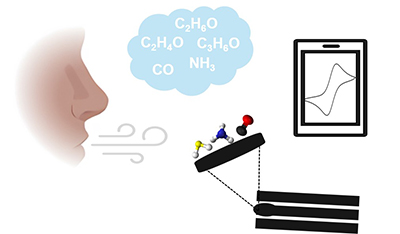
Early detection of disease is crucial to improving health outcomes. In recent decades, studies and alidation of biomarkers present in exhaled air as indicators of various medical conditions have intensified, such as respiratory and digestive diseases, cancer among others. In the global healthcare scenario, effective, rapid, and non-invasive diagnosis of these diseases at the point of care (POC) is crucial, as these locations experience the greatest patient demand. In this sense, the development of devices such as electrochemical biosensors and e-Nose are effective methods for diagnosing diseases through the analysis of exhaled air, the main source of these biomarkers. Recent research demonstrates the potential of these electrochemical sensors in detecting volatile organic compounds (VOCs) and other substances present in exhaled air that are indicative of diseases, with high sensitivity, selectivity, and reproducibility. Focusing on the diagnosis of chronic kidney disease, lung cancer, and asthma, this review explores methods for detecting substances present in exhaled air using electrochemical sensors. It then discusses the potential applications of these sensors to detect disease-specific biomarkers in exhaled air, pointing out the main challenges and perspectives to be faced for real application in disease diagnosis. Os inibidores de corrosão são substâncias inorgânicas ou orgânicas que, quando adicionadas em pequenas quantidades ao meio reacional, são capazes de retardar, ou até mesmo impedir, os processos corrosivos ocorram, pois alteram a velocidade de ambas as reações de oxidação e redução.


















